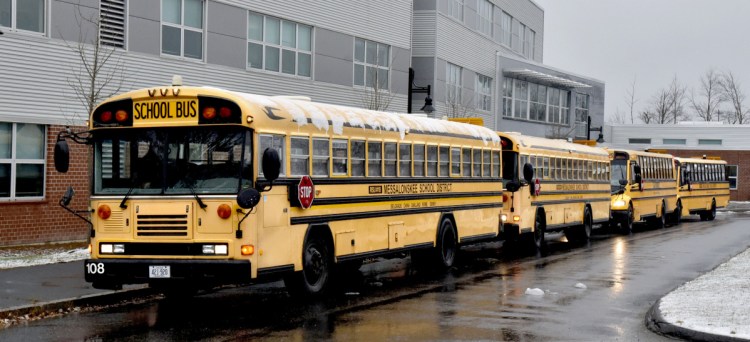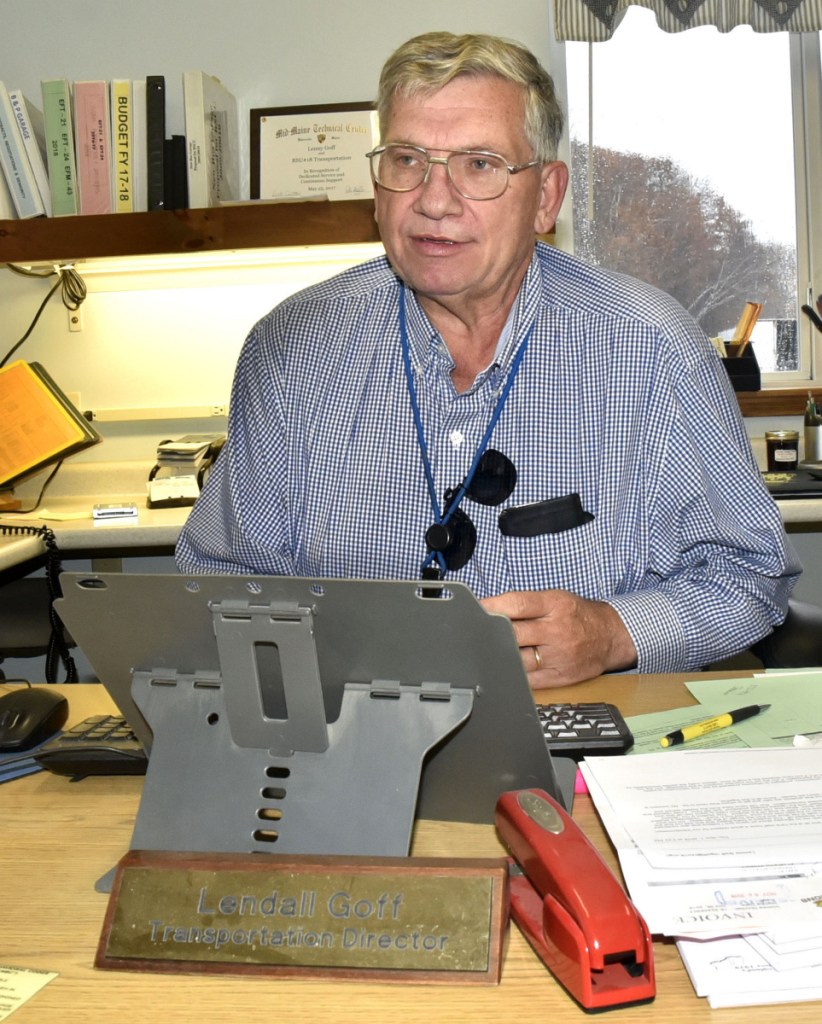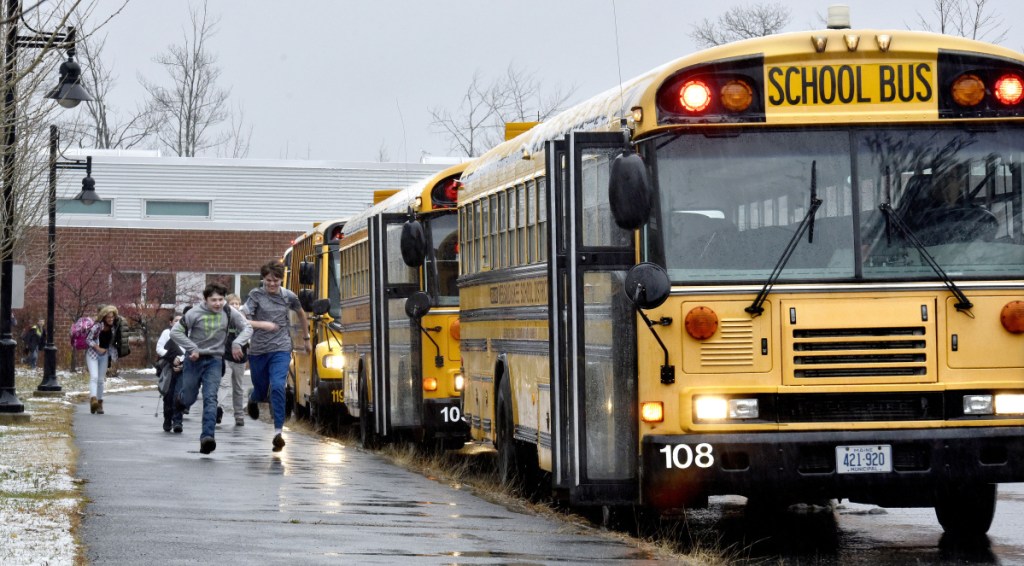OAKLAND — Regional School Unit 18 will receive funding to help replace two diesel-fueled school buses with propane-fueled school buses that will arrive before the start of the 2019-2020 school year. These environmentally friendlier buses will be used on the Belgrade and Sidney routes, which two drivers operate to carry about 150 children in grades kindergarten through 12, according to RSU 18 Transportation Director Lennie Goff.
The funding stems from the federal Volkswagen settlement related to the company’s installation of defeat devices in approximately 590,000 diesel vehicles from 2009-2016. These devices allowed emissions of nitrogen oxide — known to cause damage to the heart and lungs — to exceed between 9 and 38 times national limits. As part of the settlement, the company was required to create a $2.7 billion mitigation trust fund to finance efforts to reduce the impact of harmful emissions across the country.
Through this settlement, Maine received $21 million dollars. The state Department of Transportation oversees the distribution of these funds, which are to be doled out in three rounds of grants. Applications for Round 1 funding were due in September, and decisions were announced in late October. The Department of Transportation awarded $2.94 million to replace 32 vehicles total, which will result in an average 90 percent reduction in nitrous oxide. Most of the approved vehicles were school buses.
Of 33 towns and districts that applied for Round 1 funding, 19 were granted money to replace a maximum of two vehicles. Oakland’s RSU 18 and RSU 38, based in Readfield, were the only successful applicants in the area, each receiving funding for two new school buses. Vassalboro, Winslow, Waterville and Fairfield schools were rejected. RSU 18 includes the towns of Oakland, China, Sidney, Rome and Belgrade. RSU 38 includes the towns of Manchester, Mount Vernon, Readfield and Wayne.
“We did as good as we could do, and I think truthfully we would have qualified for more, but there just wasn’t enough money,” Goff said.
Goff noted that the district was awarded approximately $160,000, which will cover about 80 percent of the costs of the new buses. The remaining expenses will be covered by RSU 18’s budget bus allowance.
According to the Department of Transportation, applicants were evaluated by scoring them in 10 categories, including maximum emissions reductions per dollar invested, health benefits and ability to implement offset projects.
RSU 18 has a fleet of 42 buses. While none contain Volkswagen engines, all are diesel-fueled. Superintendent Carl Gartley said he is excited to have “some cleaner-burning buses” in the district.
“It’s hard to look into a parking lot and see buses idling,” he said. “It puts out a lot of fumes, and kids in our community breathe those in. (Propane-fueled buses) are a healthier option for our drivers and our students.”
Goff said that the nitrogen oxide emissions from diesel buses currently in the district’s fleet do not cause direct harm to roughly 1,850 children who ride the buses.
“It’s not a matter of, ‘They’re unsafe,’ it’s more a matter of making it better for them,” Goff said.
“We’re taking what there is that’s harmful over the long term, dirtier emissions, and we’re cleaning up those emissions,” he said. “But as far as being harmful to the kids: (nitrogen oxide) is harmful in that yeah, it’s out there, but as far as directly impacting the kids riding the bus because of it, it’s not really to that point.”
Goff noted that adding two propane-fueled buses in the district will mostly contribute to a larger, long-term reduction of pollutants.
“The impact that we’ll have is very little, but the impact that the Volkswagen settlement will have over the whole country will be huge,” he said. “The reduction in emissions will be a pretty big impact.”
RSU 18 applied for six bus replacements in Round 1, all of which are flat-nosed vehicles known as transits. Each received a total application score of 90 out of 100, meaning they met most of the Department of Transportation’s requirements for the funds.
Goff said that these six buses are ineligible for replacement by the Department of Education, but he believes they have enough wear to warrant upgrades. Conventional buses qualify for state-funded replacement when they have 125,000 miles and are at least 10 years old. Transits must have 240,000 miles and be 14 years old to be replaced by the Department of Education, according to Goff.
“They believe that transits will last longer, but I think the expectation of transits having double life is not accurate,” Goff said.
Goff said that if RSU 18 did not get funding from the Volkswagen settlement this year, it would put stress on the towns and the schools.
“Basically what would have happened is we would have either had to fund the replacement of those buses out of our local dollars or we would have ended parking them out back and just not using them because at some point they would become too expensive to try to mitigate the rust and all of that,” he said.
When the next round of applications for settlement funds opens next year, the district plans on re-submitting an application for the remaining four transit buses that did not get approved in Round 1.
https://cloudup.com/cIWLk1WWP3E
Goff said that propane-fueled buses cost about $100,000 each, which is about $10,000 more than the upfront price of a diesel bus. Fuel and maintenance expenses for propane buses typically cost less than those for diesel buses, however. While diesel buses can travel more miles per gallon of fuel, the math still shows that propane-fueled buses are a sustainable option.
“When you think about the cost reduction for propane versus diesel and then you calculate the maintenance savings because you’ve got 30 less components on an engine that possibly can break down over the life of the bus and then you calculate the mileage difference — it’s pretty substantial savings,” Goff said.
Gartley added that the long-term financial prudence of adding these buses was of great importance to the district as it applied for settlement funds.
“We wouldn’t do this just on two-year costs,” he said. “Even after this grant, it still saves the district money.”
Meg Robbins — 861-9239
Send questions/comments to the editors.





Comments are no longer available on this story